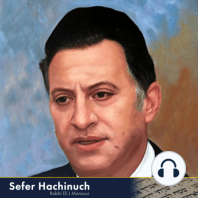20 min listen

Misva #409: The Prohibition Against Administering Capital Punishment Without a Trial
FromSefer Hachinuch
Misva #409: The Prohibition Against Administering Capital Punishment Without a Trial
FromSefer Hachinuch
ratings:
Length:
20 minutes
Released:
Mar 3, 2023
Format:
Podcast episode
Description
Amidst its discussion of the procedure to be followed in cases of murder, the Torah in Parashat Maseh (Bamidbar 35:12) commands that a murderer may not be put to death before standing trial (“Ve’lo Yamut Ha’rose’ah Ad Omdo Lifneh Ha’eda La’mishpat”). Even if the members of the Sanhedrin personally witnessed a murder, nevertheless, they may not proceed right away to execute him. Rather, they must go through due process, convening a court and testifying. This introduces a general command forbidding administering the death penalty without a trial. The reason behind this command, as the Sefer Ha’hinuch explains, is that the Torah treats human life with great care and concern, such that taking a life – even that of a criminal – must never be done flippantly, without first ascertaining beyond a shadow of a doubt that this is warranted. In fact, the Torah here in Parashat Maseh (35:25) commands, “Ve’hisilu Ha’eda” – that a court handling a capital case must do all they can within the confines of the law to acquit the defendant in order to save his life. Therefore, the Torah requires granting due process to everyone suspected of a capital offense, to the extent that even if the judges personally saw the crime, they may not execute the offender without a proper trial, so that the defendant could be given the opportunity for an acquittal. An exception to this rule is the situation of a “Rodef” – where somebody pursues his fellow to kill him, or pursues an engaged girl with the intention of violating her. In such a case, one should warn the pursuer, and if he persists, then he is put to death immediately, without a trial. The reason, quite obviously, is because he poses an immediate danger to the person he pursues, and thus in the interest in saving the threatened individual, the pursuer is to be killed immediately, without delay. This command is binding upon both men and women, and applies in the times of the Bet Ha’mikdash, when courts were authorized to administer capital punishment for certain violations. If somebody violated this command, and killed an offender without a trial, then the person who killed him – even though he was indeed guilty of the crime for which he was killed – is himself liable to capital punishment. Since he killed the offender without a trial, he has committed a capital offense for which he is liable to death. The question arises as to which prohibition the violator is punished for in such a case. As the Minhat Hinuch discusses, there seem to be two different possible approaches. On the one hand, one might claim that the one who executed the offender is put to death for violating the standard prohibition of murder (“Lo Tirsah”). Since this execution was not authorized, it constitutes an act of murder, no different than any other murder, which is punishable by execution. Alternatively, one might argue that the violator is put to death for violating the prohibition against administering capital punishment without conducting a trial. This violation might in itself constitute a capital offense, for which the person who killed the offender is liable to execution. The practical difference between these two approaches relates to the “Hatra’a” – the formal warning that must be given before a forbidden act is committed, for the violator to be liable to punishment. The warning must inform the prospective violator of the particular prohibition that he would be transgressing by committing the act. Thus, in the case of an executioner who puts an offender to death without a trial, the question becomes whether he is warned that he would be violating the general prohibition against murder, or the prohibition against executing without a trial. The Minhat Hinuch posits that the prohibition for which the executioner in this case would be liable to the death penalty is the specific prohibition against putting someone to death without a trial. Therefore, this would be the prohibition that the witnesses would have to mention in the
Released:
Mar 3, 2023
Format:
Podcast episode
Titles in the series (100)
Misva #3: Gid Ha’nashe: Daily Sefer Hachinuch - Brought to you by itorah.com by Sefer Hachinuch